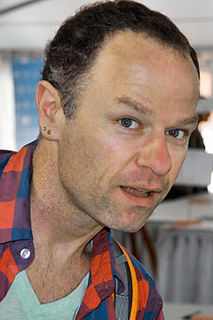A Quote by Robert Breault
It is seeing ourselves in others that often prompts the remark, 'There's something about that person I don't trust.
Related Quotes
A stranger can see in an instant something in you that you might spend years learning about yourself. How awful we all are when we look at ourselves under a light, finally seeing our reflections. How little we know about ourselves. How much forgiveness it must take to love a person, to choose not to see their flaws, or to see those flaws and love the person anyway. If you never forgive you’ll always be alone.
To see ourselves as others see us can be eye-opening. To see others as sharing a nature with ourselves is the merest decency. But it is from the far more difficult achievement of seeing ourselves amongst others, as a local example of the forms human life has locally taken, a case among cases, a world among worlds, that the largeness of mind, without which objectivity is self-congratulation and tolerance a sham, comes.
As an introvert, you can be your own best friend or your worst enemy. The good news is we generally like our own company, a quality that extroverts often envy. We find comfort in solitude and know how to soothe ourselves. Even our willingness to look at ourselves critically is often helpful.But, we can go too far. We can hoard responsibility and overlook the role others play. We can kick ourselves when we're down. How many times have you felt lousy about something, only to get mad at yourself for feeling lousy?
To get a person's real opinion, ask what she thinks everyone else believes... If people truly hold a particular belief, they are more likely to think that others agree or have had similar experiences. [People] tend to assume that other people have had life histories at least somewhat similar to their own. When we talk about other people, we are often talking about ourselves, whether we know it ourselves.
The remarkable thing is that we really love our neighbor as ourselves: we do unto others as we do unto ourselves. We hate others when we hate ourselves. We are tolerant toward others when we tolerate ourselves. We forgive others when we forgive ourselves. We are prone to sacrifice others when we are ready to sacrifice ourselves.




































